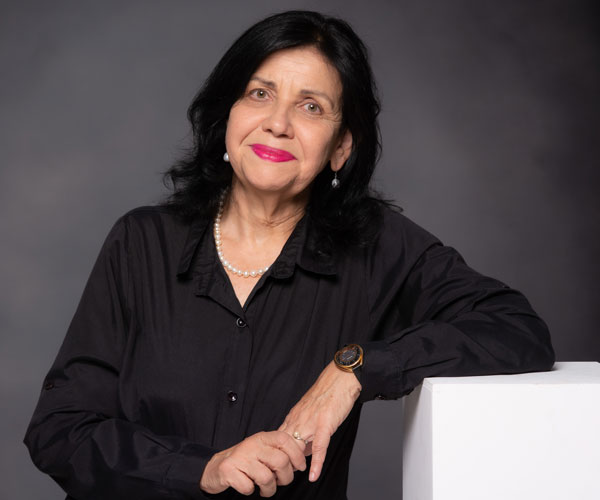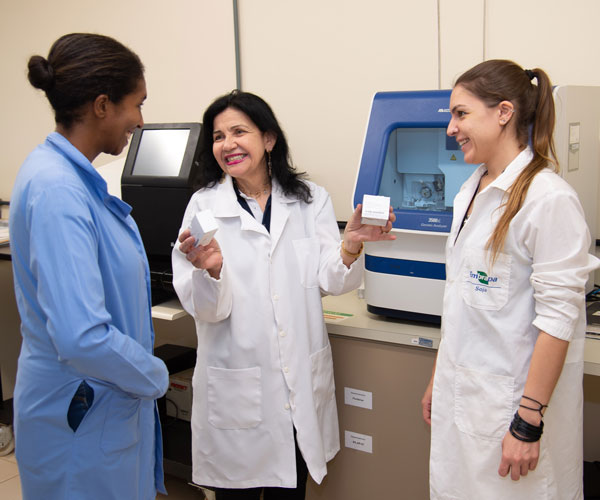Mariangela Hungria, a researcher at the Brazilian Agricultural Research Corporation (EMBRAPA) and a professor at the State University of Londrina, in Brazil, was named a winner of the prestigious TWAS-Lenovo Science Award for 2020. The award honours her studies aimed at providing farmers with fertilizers that are more environmentally friendly, substituting nitrogen-based fertilizers with cheaper and effective microbial inoculations.
The Brazilian microbiologist, reads the citation, received the prize "For her outstanding research with microorganisms, contributing to the replacement of chemical fertilizers, with economic, environmental and social impacts". Also, she is internationally recognized for her efforts to empower women in soil science and agriculture.
"I would never imagine receiving this award," Hungria said. "But the first thing I thought when I was notified was: I won't use this money for myself. Rather I will create some special funds to help women scientists in Brazil because giving them a better chance in life and career is one of the goals of my life. With the help of the Brazilian Academy of Sciences, we will do the best with this money."
The TWAS-Lenovo Award was announced after this year’s meeting of the TWAS Council. The annual award, now in its seventh edition, includes a prize of USD50,000 to each winner provided by the Chinese technology company Lenovo, the global leader in consumer, commercial, and enterprise technology that is the largest PC company in the world.
It is one of the most prestigious honours given to scientists from the developing world. The other winner of this year’s prize is Li Jiayang, a professor with the Institute of Genetics and Developmental Biology in Beijing, China.
"Mariangela Hungria is one of the leading soil microbiologists in the world, especially in the area of biological nitrogen fixation," said TWAS's President Mohamed H.A. Hassan. "Her research contributed to the successful replacement of the environmentally harmful chemical nitrogen fertilizer by microbial inoculants which resulted in saving billions of dollars in Brazil."
And Lenovo Senior Vice President George He added: "We are most pleased to congratulate the winners of this year’s award, who are both impressively accomplished researchers in the agricultural sciences. Both Li Jiayang, who has made indispensable landmark discoveries important to rice production, and Mariangela Hungria, who has introduced important environmentally friendly agricultural practices in Brazil and empowered women in her field, are spectacular researchers. And it is indeed our honour to present this year's TWAS-Lenovo Science Award to both of them.”
All because of a book
Some careers depend upon fortuitous events, like receiving an unforeseen book. This is what happened to Mariangela Hungria, whose career took shape at the age of eight when her grandmother, a biology teacher, gave her "Microbe Hunters" by Paul de Kruif. That book fueled her desire to learn more about the invisible world of microorganisms, marking her future years forever.
Hungria studied agronomy at the Luiz de Queiroz College of Agriculture, University of São Paulo, Brazil. There she received her MSc, and later earned her PhD in soil science from the Rural Federal University of Rio de Janeiro (UFFRJ), where she deepened her knowledge on Biological Nitrogen Fixation (BNF).
BNF is a process in which bacteria living in the soil transform molecular nitrogen into ammonia, which is then incorporated into amino acids and proteins. Through this reaction, bacteria promote the rescue of nitrogen, an essential element for life that would, otherwise, get lost.
Hungria started her scientific career late in the '70s, when chemistry was regarded as a relevant discipline in many fields: soil science, for example, relied mostly on chemical fertilizers. But she had a different view: she thought that low-cost elite microbes could be equally efficient as fertilizers, and started her investigations to promote their use as an environmentally friendly agent.
"Some people tried to discourage my studies on microorganisms, claiming that those studies had no future. But I persisted in what was my 'love at first sight'," she explained. "As a pioneer and an advocate of natural methods I also received pressures from some companies."
In 1982 she got a permanent position at the Brazilian Agricultural Research Corporation, where she still works as a researcher. Later, she acquired international experience working as a post-doc at Cornell University in Ithaca and at the University of California-Davis, both in the U.S. and at Seville University, in Spain.
At that time she was a single mother with two young daughters, one with special needs. Her strong will and determination granted her important achievements, in a scientific world where men were the majority.
"Studying soil bacteria and their potential I proved that soil fertility could be obtained through life, and not chemistry," she added. She found the right combinations of bacteria that, upon inoculation, would help nitrogen fixation and boost the yield without impoverishing or polluting the earth.
All-round impact
Her findings proved to have a tremendous impact on the environment: by using natural bacteria instead of synthetic fertilizers, she helped Brazil decrease water pollution by nitrates, and diminish the emission of greenhouse gases.
She also helped the Brazilian economy break free from chemistry-at-any-costs. There is always pressure from chemical companies to recommend the use of 30-50 kilograms of fertilizers per hectare of soil, with a cost of US$1 per kilogram. As Hungria pointed out, there is no need to apply any Nitrogen-based fertilizers. “While the farmers spend as little as US$2-3 per hectare with the bacteria inoculant, to attend the whole nitrogen demand of the soybean crop in 37 million hectares in Brazil would cost as high as US$14,5 billion a year." Not to mention that fewer chemicals mean better quality of life for the farmers themselves.
In 1991 Hungria accepted an offer to start a new soil microbiology group at the Embrapa-Soybean Center, in Londrina, Paraná, a state with a major vocation in agriculture. There she began supervising students and working with farmers.
"Meeting with farmers, teaching them new technologies and listening to their needs is an important and rewarding part of my work," she admitted. "Since we move from basic to applied science we need to explain in simple words our research, and adjust our language to their capacity." Discussions are usually productive: aiming to meet the farmers' needs Hungria succeeded in finding new combinations of bacteria that, if inoculated simultaneously, were able to double the beneficial effects on soil with a marked increase in the yield.
Her pioneer studies allowed releasing several new technologies on the market, and the identification of the first strains of a bacterium called Azospirillum brasilense, approved by the Ministry of Agriculture, which is now used in inoculants to promote the growth of cereal grains such as maize and wheat. Today, more than 70 million doses of inoculants carrying rhizobia and Azospirillum are commercialized per year in the country.
Another major contribution that has granted Hungria the Lenovo award is the support she keeps giving to women scientists, by encouraging young researchers to take on important roles in science without giving up the idea of becoming mothers.
"In my lab, we are completely against the competition: everybody must help others. Women are very good at this, and I always offer my support telling them that they do not have to choose between career and family," the scientist clarified. Not surprisingly, most of her former students are women.
Hungria is the recipient of numerous awards, including Award and Medal of the National Merit of Agronomy by the Federal Organization of Engineering and Agronomy (CONFEA/CREA), as the National Agronomist of the Year (2018); Award and Medal of the National Order of Scientific Merit, Grã-Cruz Order in the area of Agricultural Science, nominated by the President of Brazil (2018); Award and Medal “Antonio Carlos Moniz”, the highest honour of the Brazilian Society of Soil Science, as the Soil Scientist of the Year (2019). She was also the first woman to serve as the Vice-President (1999 -2001) and President (2001-2003) with the Brazilian Society of Soil Science.
The list of her publications includes more than 300 scientific papers, with more than 30 new technologies adopted in the agricultural field. But she likes to think of herself as of a women-scientist-mother who encourages other women not to give up their dreams: "I'm a “godmother” and “grandmother” of several of my children's former students. Empowering women and convincing them that they can make it, is a great reward for me. In addition, I think that women are more concerned about the environment, social care, clean technologies. I also encourage single mothers and those with children with special needs to follow on with their careers. You may be surprised, as what may seem to be a major limitation in your life can strengthen you at work”.
Cristina Serra
About Lenovo
Lenovo (HKSE: 992) (ADR: LNVGY) is a USD50 billion global Fortune 500 company and a leader in providing innovative consumer, commercial, and enterprise technology. Its portfolio of high quality, secure products and services covers PCs (including the legendary Think and multimode YOGA brands), workstations, servers, storage, smart TVs and a family of mobile
products like smartphones (including the Motorola brand), tablets and apps. Join Lenovo on LinkedIn, follow it on Facebook or Twitter (@Lenovo) or visit at www.lenovo.com.
About TWAS
The World Academy of Sciences for the advancement of science in developing countries – TWAS – supports sustainable prosperity through research, education, policy and diplomacy. TWAS was founded in 1983 by a distinguished group of scientists from the developing world, under the leadership of Abdus Salam, the Pakistani physicist and Nobel Prize winner.
Today, TWAS has more than 1,270 elected Fellows representing more than 100 countries; 14 of them are Nobel laureates. The Academy is based in Trieste, Italy, on the campus of the Abdus Salam International Centre for Theoretical Physics (ICTP). Through more than three decades, its mission has focused on supporting and promoting excellence in scientific research in the developing world and applying scientific and engineering research to address global challenges. TWAS receives core funding from the government of Italy and essential programmatic funding from the Swedish International Development Cooperation Agency (Sida). It is a programme unit of the United Nations Educational, Scientific and Cultural
Organization (UNESCO).

